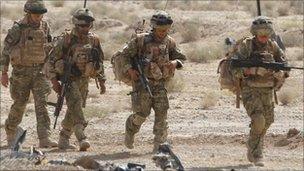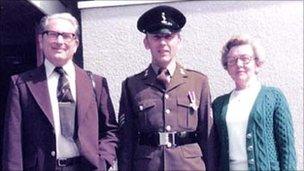Military morale: 'Huge sacrifice'
- Published

British Army Ammunition Technical Officers in Afghanistan
The Royal British Legion has accused the prime minister of going back on his word to set in law a military covenant between the nation and its troops.
Meanwhile the Army Families Federation (AFF) is warning of low morale in the military because of "attacks" on soldiers' allowances. The organisation says it has been inundated with outraged messages following a tightening of the rules on continuity of education allowance (CEA).
Here, BBC website readers share their views.
Anon, Surrey, partner of serving soldier
We already make huge sacrifices for my partner to be able to serve this country. I have had to change career, go through months of enforced separation by hundreds of miles every week. I am prepared to sacrifice living where I want, seeing my family and friends, having my own career in order for him to continue in the Army but now they are asking for us to sacrifice the future of our children as well!
We have the best armed forces in the world and people often praise our troops for their dedication and professionalism. I think the support on offer is good but a lot of it is provided by forces charities and the informal community of the armed forces. My personal view is that whilst we are fighting, our troops should be offered everything they need both at home and abroad.
My partner (whilst not delighted) is happy to accept a pay freeze but when he is also having to cover extra jobs, the loss of allowances seems unfair. Before the election Mr Cameron made much of the fact he wanted to improve the way the armed forces are treated and yet the budget is being cut all around them.
My partner is a career soldier. He will stay in the Army until the day they force him to leave kicking and screaming. I do think that if these cuts carry on and he is asked to do more and more he will have to consider a life in civvy street. His future may be affected by the loss of continuity of education allowance (CEA). Due to his role he is required to move every two years and this has been overseas in the past. I think he would consider leaving his current role and possibly become an instructor or recruiter in order to help provide stability for children.
Families are not separate from the Army. When a partner is deployed you write letters, send packages, and represent him at home. If he is low you have to find the strength to support him.
My partner just gets on with the job because that is what he is trained to do. When you hear from your loved one, how angry and let down he may feel about how he is treated, it makes the sacrifices you make even harder to swallow.
Mike Still, St Boswells, Scotland, former engineer, Royal Signals

I served as a telecommunication engineer in the Royal Signals from 1960 until 1984 and saw all the ups and downs of service pay and allowances associated with that era.
There were times when our morale was low but we never suffered the intensity of warfare that those serving today endure. Whilst accepting that the economic pain has to be shared by all, the reductions in various allowances come on top of the the years of poor, indeed dangerous, shortfalls of proper equipment, inadequate housing and lack of dedicated medical facilities, and it is very easy of the government to hit those who cannot hit back.
The services have been experiencing their pain for the last decade and it is time that this government recognised the fact and properly supported them. Labour hammered the armed forces in to the deck and now David Cameron is increasing the pain by not delivering what he promised.
Education Allowance is so important to servicemen. My son benefited from it. A life in the Army means you could be moving every 18 months and if you move your child's school as well, it doesn't do them any good.
I left the army with a valid qualification and could slot straight in to industry. If my son told me he wanted to serve, it would depend on what he wanted to do. If he had a career path that he wanted to follow in the army, then I wouldn't have a problem. For infantry men, there isn't much support. The service personnel today are being let down on a day to day basis.
Anon, Germany, Royal Air Force
I am in the Royal Air Force but the problems are the same. I have served for 25 years and have risen to a reasonably senior position, however I cannot now afford to stay in the service.
We are under a two year pay freeze. Our overseas allowances have been drastically cut (about £500 a month - or more), promotion opportunities are practically non-existent, redundancy and job loss looms (30% of overseas posts are reportedly to be cut) and the costs of having our son educated at boarding school (there is no English speaking option here) are rising and rising.
For most of my career the interests of the Service have eclipsed our own during a number of overseas posts and many operational deployments. Not now; I feel betrayed by the metropolitan elite who treat HM Forces with contempt. I am being financially punished because of the largesse of the financial services sector and the scorched-earth spending policy of the previous government.
I have loved almost every minute of my career but now live in deep regret that I didn't leave before a family came along. I cannot afford now to stay in and hope that I am made redundant, notwithstanding the changes (read reductions) of our pension payments.
When I return back to the UK I will line up some interviews to see what else is out there.
Rob, Glasgow, currently serving
In the last 10 years the Army has gone through massive changes right down to grass roots level. We are more professional, better equipped and our training is now mission specific but all this has come at a cost.
Unfortunately that cost is borne by all ranks as nowadays we are either deployed on operations or training for them and I can see that this is being pushed down from senior level commanders who seem afraid to tell politicians the truth or the politicians refuse to listen.
We used to be about the mission and the men but now I feel we are no more than pawns in top level commanders' celebrity careers. Some soldiers may read this and question my loyalty but I will remind them that loyalty is a two-way street.
We need to get back to the days of good solid man management and dare I say it the old regimental system where regiments have an affiliation with a particular and very specific area.
Contrary to popular belief soldiers don't fight for Queen and country, they fight as they would rather die than let down their mates or their regiment.
The public support for troops is excellent and it is in fact quite humbling when you receive letters and welfare parcels when you are on operations from people that although they don't know you, have taken the time and effort to send you things.
As for support from the government it sounds good and a big deal is made of so called new initiatives however these are very generic and at the end of the day they offer very little.